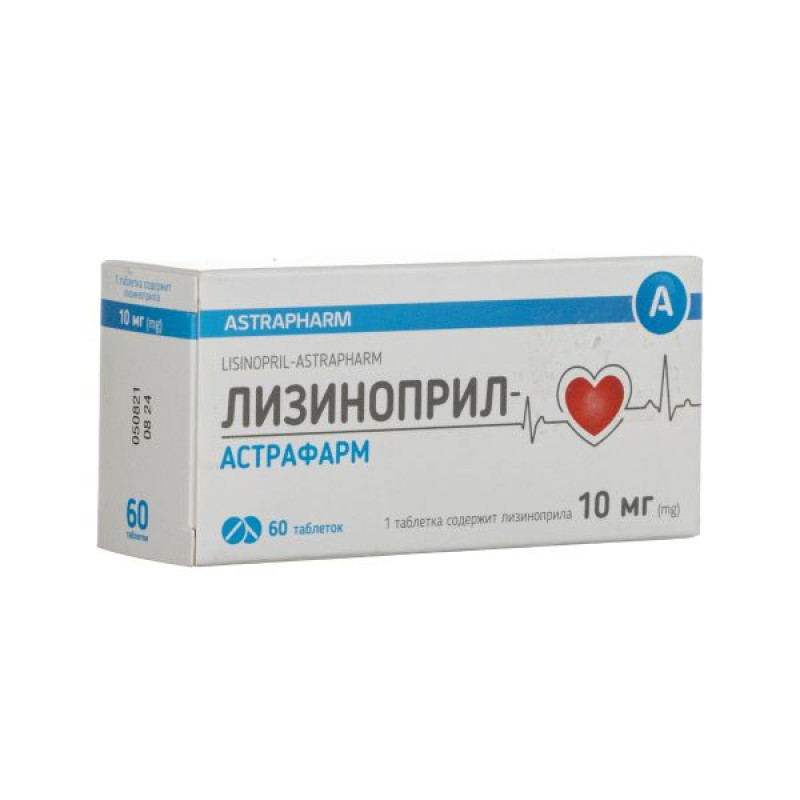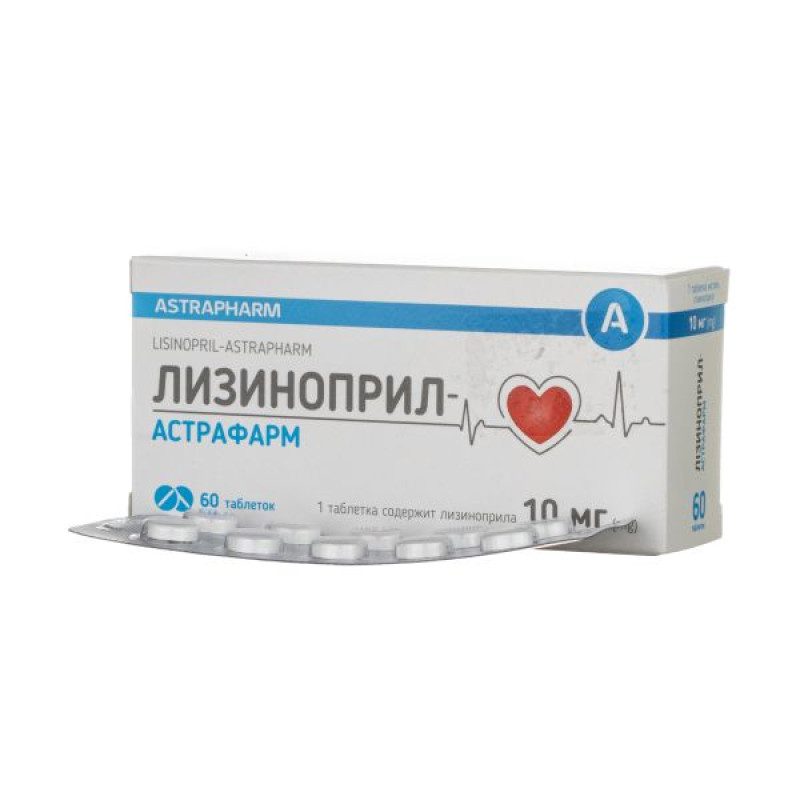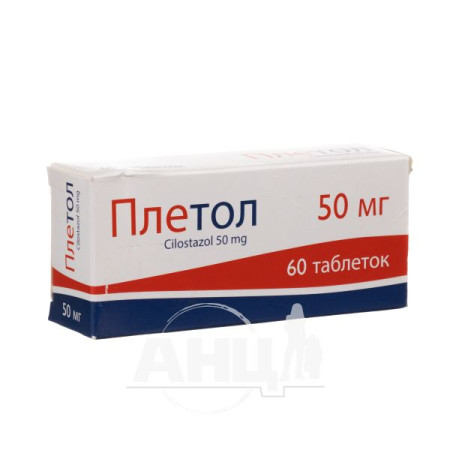Lisinopril tablets 10 mg No. 60

Lisinopril-Astrapharm tablets are used for the following indications:
Arterial hypertension. Chronic heart failure. Acute myocardial infarction in patients with stable hemodynamic parameters (systolic blood pressure > 100 mm Hg). Diabetic nephropathy in diabetes mellitus (in patients with insulin-dependent diabetes mellitus type II).Composition
Active ingredient: lisinopril;
1 tablet contains lisinopril 10 mg;
Excipients: calcium hydrogen phosphate, talc (E 421), corn starch, magnesium stearate, colloidal anhydrous silicon dioxide.
Contraindication
Hypersensitivity to lisinopril, to any of the excipients or to other ACE inhibitors. History of angioedema (including after ACE inhibitor use, idiopathic and hereditary oedema). Aortic or mitral stenosis or hypertrophic cardiomyopathy with severe haemodynamic compromise. Bilateral renal artery stenosis or stenosis of the artery to a solitary kidney; acute myocardial infarction with unstable haemodynamics; cardiogenic shock; concomitant use of the drug with high-flux membranes of polyacrylonitrile sodium-2-methylallylsulfonate (e.g. AN 96) for emergency dialysis; patients with serum creatinine ≥ 220 µmol/l. Concomitant use of aliskiren-containing drugs in patients with diabetes mellitus or renal impairment (GFR < 60 ml/min/1.73 m2). Primary hyperaldosteronism.Method of application
Tablets are taken orally once a day, preferably at the same time, regardless of meals. The daily dose is selected individually depending on the patient's response and blood pressure indicators.
Application features
Pregnant women
Contraindicated.
Children
The safety and effectiveness of lisinopril in children have not been established, therefore Lisinopril-Astrapharm should not be prescribed to this age group of patients.
Drivers
It is necessary to take into account the possibility of dizziness and fatigue, which may affect the ability to drive vehicles or other mechanisms.
Overdose
Symptoms: hypotension, circulatory shock, electrolyte disturbances, renal failure, hyperventilation, tachycardia, palpitations, bradycardia, dizziness, restlessness and cough.
Treatment: intravenous saline. In case of hypotension, the patient should be placed on his back with his legs raised. If possible, angiotensin II infusion and/or intravenous catecholamines are administered. If the drug has been taken recently, gastric lavage, the use of absorbents and sodium sulfate are indicated. For the treatment of persistent bradycardia, the use of a pacemaker is indicated.
Constant monitoring of laboratory parameters (determination of serum electrolytes and creatinine levels) and vital signs is recommended.
Lisinopril can be removed from the body by hemodialysis, however, the use of polyacrylonitrile metal sulfonate high-flux membranes (e.g. AN69) should be avoided.
Side effects
From the blood system: decreased hemoglobin and hematocrit, bone marrow depression, anemia, thrombocytopenia, leukopenia, neutropenia, agranulocytosis, hemolytic anemia, lymphadenopathy, autoimmune disease. From the metabolism: hypoglycemia. From the central nervous system: dizziness, headache, mood swings, paresthesia, taste disturbance, sleep disturbance, balance disturbance, disorientation, confusion, smell disturbance, symptoms of depression, fainting. From the cardiovascular system: orthostatic effect (including hypotension), myocardial infarction or cerebrovascular stroke, possibly secondary to excessive hypotension in high-risk patients, palpitations, tachycardia, Raynaud's phenomenon. From the musculoskeletal system: muscle spasms have been reported. Respiratory: cough, bronchitis, rhinitis, shortness of breath, dyspnea, angioedema, bronchospasm, glossitis, sinusitis, allergic alveolitis/eosinophilic pneumonia. Upper respiratory tract infections have been reported. Gastrointestinal: diarrhea, vomiting, nausea, abdominal pain, dyspepsia, dry mouth, decreased appetite, taste perversion, pancreatitis, intestinal angioedema, constipation, hepatitis (hepatocellular or cholestatic), jaundice and hepatic failure. Skin: rash, itching, hypersensitivity / angioedema of the face, extremities, lips, tongue, glottis and / or pharynx, feeling of heat, skin hyperemia, urticaria, alopecia, psoriasis, increased sweating, pemphigus, toxic epidermal necrolysis, Stevens-Johnson syndrome, erythema multiforme, lymphocytoma of the skin. A syndrome has been reported that includes one or more of the following symptoms: fever, vasculitis, myalgia, arthralgia / arthritis, the appearance of positive antinuclear antibodies, accelerated erythrocyte sedimentation rate, eosinophilia and leukocytosis, rash, photosensitivity or other skin manifestations. Urinary system: renal dysfunction, uremia, acute renal failure, oliguria / anuria. Endocrine system: inappropriate secretion of antidiuretic hormone. Reproductive system: impotence, gynecomastia. General disorders: increased fatigue, weakness.Interaction
The simultaneous use of the drug and high-flow membranes made of polyacrylonitrile sodium-2-methylsulfonate (e.g. AN 69) during emergency dialysis is contraindicated.
ACE inhibitors potentiate the effect of ethanol. Ethanol increases blood pressure, reducing the effect of ACE inhibitors.
Storage conditions
Store at a temperature not exceeding 25 °C.
Keep out of reach of children.
Shelf life - 3 years.
There are no reviews for this product.
There are no reviews for this product, be the first to leave your review.
No questions about this product, be the first and ask your question.







